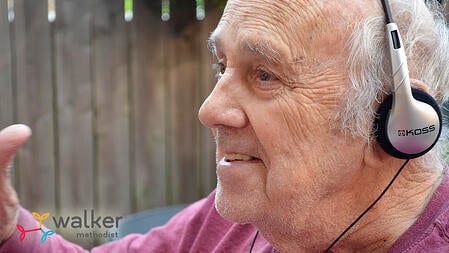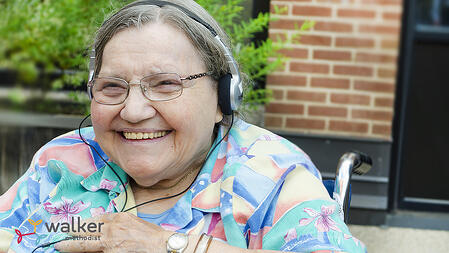The Promising Science Behind Music & Memory ®
Walker Methodist | Sep 24, 2014
As you may know, when you hear a song that you associate with a particular moment in your life, it has the power to trigger profound personal memories. In fact, music can be the bridge that connects our brains to forgotten, long-term memories.
For those individuals suffering from Alzheimer’s and other forms of dementia, the memory of names, places, and facts are compromised, but oftentimes the memories from younger years can be well-preserved. Just as we experience the connection between music and our memory, those suffering from various memory-altering diseases can have the same experience and comfort.
Music for Memory Loss
Favorite songs and music that associate with significant personal events hold power in the brain. They can trigger memories of not only the lyrics, but the experiences connected to that particular music. A listener’s favorite music has the power to calm forms of chaotic brain activity and enables that listener to live in the present moment. It can often empower them to reconnect with others around them and feel more like themselves.
Those suffering from dementia, Parkinson’s, and other diseases that alter and damage the brain’s chemistry are often able to reconnect to the world around them during and after listening to their favorite music, improving their quality of life and mood. Music has also been linked with slowing memory loss, increasing recognition and recollection, and improving the lifestyles of residents using the music program.
What Music Does for Our Brains
 So, how does music therapy affect the brain? Well, in a September 2013 video excerpt from a segment of The Doctors featuring Music & Memory®, Dr. Travis Stork explains how the brain can process music. And during the segment, Dr. Laura Mosqueda, Director of Geriatrics at the University of California, Irvine School of Medicine, explains some of the science behind music therapy and what happens to the brain when it is affected by dementia.
So, how does music therapy affect the brain? Well, in a September 2013 video excerpt from a segment of The Doctors featuring Music & Memory®, Dr. Travis Stork explains how the brain can process music. And during the segment, Dr. Laura Mosqueda, Director of Geriatrics at the University of California, Irvine School of Medicine, explains some of the science behind music therapy and what happens to the brain when it is affected by dementia.
“It turns out a multitude of things are occurring [when you listen to music]. First and foremost, when you’re hearing that music, your primary auditory center in the temporal lobe is processing that music and interacting with your frontal lobe…that’s just the first step. When you start to hear the words, different areas of the brain are involved in understanding the words or producing the words to sing along to the song. The visual cortex may play a role [when you begin to associate a specific time or picture of a memory]… and if you’re tapping your toes, the motor cortex is involved as well. The medial pre-frontal cortex really gets stimulated when a particular memory is taking place. That helps develop a long-term memory associated with a particular song or type of music…which is truly remarkable.” – Dr. Travis Stork
“When listening to music and you experience a change in mood, an individual suffering from Alzheimer’s and dementia “is now involving so many of the other parts of the brain [described by Dr. Stork] that haven’t been damaged by the Alzheimer’s disease, and those parts still work…that’s part of the ‘never give up hope’. Because even though there’s parts that aren’t working, there’s a lot of parts [of the brain] that still are, and what they [Music & Memory] did was find a way to reawaken those parts, and let them be useful.” – Dr. Laura Mosqueda
The benefits of personalized music have been well-studied and documented by a number of distinguished researchers, including Music & Memory board member, Dr. Connie Tomaino and Dr. Oliver Sacks, co-founders of the Institute for Music and Neurologic Function.
“You can see the value of this program as being not just a casual activity, but almost a necessity for daily care, because of the promise and potential that it has for enhancing quality of life.” – Dr. Concetta Tomaino
Dr. Oliver Sacks, the author of Musicophila: Tales of Music and the Brain, discusses the impact of music for memory loss on people suffering from Alzheimer’s or dementia:
“Some of them are confused, some agitated, some lethargic, some have almost lost language, but all of them, without exception, respond to music, especially to old songs and songs they’ve once known. These seem to touch springs of memory and emotion which may be completely inaccessible to them...They sort of regain that time of their lives, that identity they had when they first heard the song.” – Dr. Oliver Sacks
So, how does music therapy help? Sacks found that personal memories are embedded to some extent, especially in music – which allows individuals to regain a sense of identity while they listen to their personalized music, and some time afterward:
“The past which is not recoverable in any other way is embedded, as if in amber, in the music, and people can regain a sense of identity.” – Dr. Oliver Sacks
Why is Music Therapy Important?
The use of Music & Memory's personalized music programs can act as a coping mechanism for individuals with memory loss. In 2020, researchers from UC Davis performed a study on the effects of Music & Memory among nursing home residents with dementia. They learned that these music programs are “associated with a reduction in the amount of antipsychotic medication taken by nursing home residents and fewer distressed behaviors.”
 These programs offer individuals suffering from brain diseases a form of relief from their symptoms. With Music & Memory's therapeutic mechanisms, the emotional distress of dementia becomes much more manageable. Though, different music therapies can increase the relief that individuals receive.
These programs offer individuals suffering from brain diseases a form of relief from their symptoms. With Music & Memory's therapeutic mechanisms, the emotional distress of dementia becomes much more manageable. Though, different music therapies can increase the relief that individuals receive.
According to research in 2018 performed by the Health University of Utah, personally meaningful and familiar music has the potential to show “measurable improvement in mood, awareness, and quality of life for people with dementia.” By developing personalized music programs with songs that resonate with these individuals, Music & Memory offers people with dementia a simple way to experience significant clarity, and reestablish their sense of identity.
See for Yourself
With the support of the Music & Memory program, we have developed the Miracle of Music campaign. The Miracle of Music works to raise funds and put iPods and music into the hands of our senior residents who are suffering from Alzheimer’s and other forms of dementia.
We’ve created a fundraising site, www.miracleofmusic.us, in an effort to spread the word about the power of music. All donations raised on this site will provide an iPod shuffle, headphones, and music to those residents at Walker Methodist who need it most. Additional donations beyond our goal will go to Music & Memory distributions nationwide.
Support a great cause and help dementia patients find themselves, through music. Donate today!

